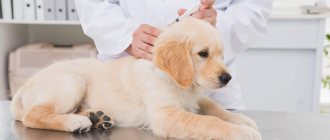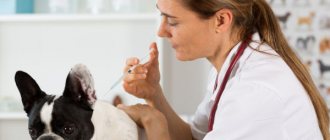If a dog appears in the family, you need to think not only about nutrition and care, but also about the health of the pet. While walking on the street, she can become infected with dangerous infections transmitted in different ways.
Pathogens can be brought into the home on clothing or the soles of shoes. Timely vaccination according to the calendar will help protect your dog from various diseases.
In the article we will look at the importance of vaccinations for dogs, what diseases they protect against, types of drugs and vaccination schedules, contraindications.
Dog vaccination rules
Protective antibodies obtained from mother's milk remain in the puppies' bodies for up to 1.5 months. Gradually, the natural immune defense begins to weaken, so there is a need for vaccination, which forms the body’s artificial defense against various types of infections.
Dogs are vaccinated according to the vaccination schedule, starting at two months of age. Vaccinations are done according to certain rules. Before the procedure, the dog must be properly prepared, which will eliminate side effects and other undesirable consequences of vaccination.
How to prepare your dog for the procedure
Vaccination is carried out only for healthy animals. Before vaccination, the veterinarian must examine the dog and give permission for this procedure.
Preparing the dog:
- 2 weeks before vaccination it is necessary to carry out antiparasitic treatment, including deworming.
- Measure the dog's body temperature daily for 7 days before vaccination.
- Avoid contact with other animals for several days before the procedure.
The owner must monitor the dog's condition, provide adequate nutrition and control stool. If certain signs of illness are detected, you should contact your veterinarian and explain in detail what signs are suspicious. The doctor will conduct a follow-up examination and take tests if necessary. If the animal's unhealthy condition is confirmed, vaccination will be postponed until the dog has fully recovered.
Caring for your pet after vaccination
After vaccination, it is necessary to follow some recommendations from care professionals.
What do we have to do:
- Limit contact with other animals.
- Provide the dog with good nutrition and rest.
- On the day after vaccination, any physical activity and bath procedures are contraindicated.
Detailed recommendations for caring for your dog after the immunization procedure are provided by the attending veterinarian.
How to prepare your pet for vaccination
Vaccination of a dog is allowed only after examination by a veterinarian, however, when administering the injection independently, the owner also takes on these functions. He must visually assess the puppy’s health, measure its temperature rectally; values up to 39 degrees are considered normal, make sure that it is active and does not refuse food. A week before the planned vaccination, the dog is not physically stressed, active walking areas for other pets are avoided, young animals should not be taken outside at all, deworming is carried out 14 days before vaccination, and external parasites are removed.
Types of vaccines
Dogs are given two types of vaccinations - live with a weakened virus and non-live. Based on the number of antigens, vaccines are divided into monovalent and polyvalent. The first contain antigens of one disease. The latter form immunity to several infections at once.
Veterinary clinics will offer the owner vaccines of imported and domestic production. Most experts give preference to foreign drugs that show high efficiency. The cost of such vaccines is somewhat more expensive than their domestic counterparts.
Preparations for vaccination of Yorkie
Foreign and domestic vaccines have been created and are being actively used. Each of them has its own disadvantages and advantages; in choosing, it is better to trust a veterinarian with a good reputation. Vaccines can be monovalent - against one disease, and polyvalent - against several diseases at once. The second option does not always suit veterinarians; some of them believe that weak immunity is developed.
Typically, vaccines for pets consist of two components: liquid and dry. They are mixed and injected with a syringe subcutaneously (at the withers) or intramuscularly (into the thigh). The components are stored in the refrigerator, and the finished solution is stored for no longer than 30 minutes.
Popular and proven drugs for vaccinations:
- Nobivac;
- Eurican;
- Vakderm;
- Vanguard;
- Biovac;
- Multikan;
- Polivac.
What vaccinations are given to puppies up to one year old?
In the first year of life, the dog receives 5 mandatory vaccinations, followed by revaccination within strictly defined periods. At the request of the owner and the recommendation of the doctor, additional vaccinations against certain infections at risk for a particular animal can be given.
Vaccination schedule for puppies
The most dangerous diseases for dogs are rabies, distemper, parovirus enteritis, leptospirosis, enteritis, parainfluenza and viral hepatitis. Most of these diseases are difficult to tolerate and can lead to the death of the animal. Some infections are also dangerous for humans. For example, rabies and leptospirosis, which affects the liver, kidneys and stomach.
Timing of vaccination for dogs in the first year of life
From distemper, leptospirosis, viral hepatitis, enteritis and parainfluenza Primary vaccination - 8-10 weeks Revaccination - 11-13 weeks Repeated vaccination - 6-7 months. and at 12 months.
Rabies Primary vaccination – 11-13 weeks
Additionally, the dog can be vaccinated against trichophytosis and microsporia. The recommended age for the planned procedure is 2-6 months of life, the second vaccination after 2 weeks. Revaccination – every year with an interval of 12 months.
What diseases does a comprehensive vaccination for dogs protect against?
Preparations with different combinations of microbes and pathological cultures contribute to the development of immunity against many infections. Every comprehensive vaccination for dogs helps fight rabies and other deadly diseases. The list includes the most dangerous diseases that a pet can contract through contact with an infected animal.
These include:
- rabies;
- piroplasmosis;
- carnivore plague;
- parvovirus enteritis;
- leptospirosis;
- adenovirus;
- viral hepatitis;
- parainfluenza;
- lichen;
- bordetellosis;
- borreliosis.
It is very important for pet owners to know how to give their dog a comprehensive vaccination and where to give it themselves. However, vaccination should only be carried out under the supervision of a veterinarian. All vaccinations for dogs are included in a special passport and are carried out in strict accordance with the schedule.
Vaccination of adult dogs
Adult dogs are vaccinated against the same infections as small puppies. After primary vaccinations, the animal’s body has good protection against viruses for a certain period of time, but gradually it weakens, so revaccination is necessary.
Revaccination schedule for adult dogs
Against plague, parovirus enteritis and hepatitis Revaccination every 3 years
Coronavirus enteritis, microsporia, parainfluenza Annual revaccination with an interval of 12 months.
Leptospirosis Revaccination once every 12 months annually. According to indications, the terms may be reduced.
Vaccination calendar: vaccination of dogs against rabies
Rabies is a dangerous infectious disease that cannot be cured. If infected, the dog dies painfully. The disease also poses a threat to humans. To protect the whole family, be sure to vaccinate your pets against rabies according to the vaccination schedule.
Rabies vaccination and revaccination schedule for dogs
First rabies vaccination 12-13 months
Revaccination Every year with an interval of 12 months.
Where is it better to get vaccinated: at home or in a clinic?
You can vaccinate your dog at home or at a veterinary clinic. The main thing is to enter all the data about the procedure performed into the pet’s veterinary passport.
Features of vaccination at home and in the clinic:
- Vaccination at home is easier for animals. In a familiar environment, the dog feels safe. In addition, you do not have to organize a trip to the clinic. You need to call an experienced veterinarian to your home. It is very important that he follows all vaccination rules and uses high-quality drugs for administration. The only drawback of this procedure is the additional costs associated with paying a specialist to visit your home.
- Vaccination at the veterinary clinic is carried out as planned. You must make an appointment in advance. It is better to transport the dog to the clinic in a private car to avoid any contact on the street with other animals. The cost of the procedure is low.
The owner needs to think in advance which of these two options will be optimal for his pet.
How much does a comprehensive vaccination for a dog cost?
The cost of the procedure depends on several factors. The price is affected not only by the drug used to vaccinate the animal. The cost of comprehensive vaccinations for dogs may increase depending on the category of vaccine and the general procedures performed on the pet. The price is determined by the location of the vaccination in a clinic or at home.
The average cost of the polyvalent vaccine Multakan, Biovac is 1-1.2 thousand rubles. Carrying out the procedure at home using a foreign-made drug can cost 1.4-1.6 thousand rubles. In clinics, the price of the procedure is set at 900-1,000 rubles. It is important to consider that when applying for a veterinary passport, the price for the procedure increases by 100-200 rubles.
Exceptions and contraindications
Dogs are vaccinated according to the vaccination calendar, but in some cases the procedure has to be postponed for a certain period. There are also some contraindications to vaccination of some animals. Let's take a closer look at this issue.
When not to vaccinate your dog:
- The animal is sick.
- Low immunity.
- Vaccinations are not given to puppies under 2 months of age.
- During the period of change of milk teeth.
- Before mating (90 days quarantine after vaccination).
- The dog was found to have an individual intolerance to the components included in the vaccine, which manifests itself as an allergic reaction.
Puppies growing up without a mother can receive their first vaccination at 6-8 weeks. This is due to a lack of natural immune protection, which the baby could not receive from mother's milk.
The timing of vaccination may change due to the epidemiological situation in the area. For example, if outbreaks of certain infections are recorded, the dog may be vaccinated ahead of schedule.
How and where is the injection given?
The rabies vaccine is usually given subcutaneously (at the withers), but some drugs can be administered intramuscularly. Before vaccinating your dog, your veterinarian will perform an examination. Only disposable syringes are used for the procedure. After the session, a mark is placed in the veterinary passport. It indicates the date of vaccination and the drug used.
On a note! Vaccinate your dog only in a reliable veterinary clinic in Moscow. Avoid dubious offers and trust only professionals.
Contraindications to rabies vaccination
It is strictly forbidden to vaccinate a dog that is sick or has not undergone deworming. If your pet has chronic diseases, be sure to undergo a preventive examination before the procedure and take tests (if necessary, prescribed by a veterinarian).
Contraindications:
- age up to 3 months;
- pregnancy (a pregnant bitch can only be given a vaccine against rabies called “Rabizin” - it is believed that it does not affect the development of pregnancy and the fetus);
- weakened body;
- rehabilitation period (for example, after an injury);
- underweight.
After vaccination
After vaccination, the dog remains in the clinic under observation for about 20-30 minutes. Then she must be taken home and ensure complete rest. Don't forget that walking (especially in public places!) is highly undesirable. The pet needs peace and time so that it can fully relax. At the same time, the vaccinated dog must be provided with free access to food and water.
The recovery period after vaccination lasts 10-14 days. During this time it is undesirable:
- excessive water procedures;
- intense loads;
- hypothermia or overheating of the pet;
- communication with other animals.
Possible reactions
Carefully monitor your pet's condition for 3-5 days after vaccination. At first, the dog may experience slight discomfort. Typically, animals become less active, their appetite decreases, and their temperature may rise. The area where the shot was given may be slightly swollen.
All this is a normal reaction to the effect of the vaccine, so you should not be afraid of it. If you notice other signs (such as vomiting or diarrhea), contact your veterinarian immediately!
Dog vaccinations: pros and cons
Vaccination of pets is carried out with the consent of the owner, so only he can decide whether to vaccinate the pet or not. According to veterinarians, it is unacceptable to refuse such a procedure. The risk of infection in unvaccinated animals is very high. Not only other dogs or rodents can be carriers of infection. Some diseases are transmitted by airborne droplets, entering the house along with dust particles, food, etc. By refusing vaccination, you are exposing the life and health of your dog to enormous risks. The diseases for which vaccinations are given cause serious complications, which can result in the painful death of the animal. To avoid dangerous consequences, you need to listen to the opinion of doctors and vaccinate your dog according to age.
Disadvantages of vaccination are possible complications that arise after the injection. The dog's body temperature may rise, loss of appetite, general condition worsen, vomiting and loose stools. If side effects are detected, the animal must be urgently shown to a specialist. The veterinarian will select treatment to eliminate adverse symptoms.
Complications of vaccination occur infrequently and are mainly due to improper preparation of the animal for the planned procedure or when using a low-quality vaccine. The doctor must examine the dog before giving the vaccination. To ensure everything goes smoothly, choose trusted veterinary clinics with a good reputation and qualified staff.
Should an old dog have vaccinations?
There is an opinion that after 8 years of age a dog does not need to be vaccinated. In fact, none of the instructions for the vaccine contain any restrictions related to the age of the animal. The only condition is that the animal must be clinically healthy. Therefore, the veterinarian has the right to postpone or cancel vaccination, taking into account the clinical condition of the animal, but not on the basis of great age. Without annual vaccination, your dog becomes vulnerable to infections, so the possible harm from vaccination is more than offset by the benefits of vaccination.
Everything you need for a happy and comfortable life for your four-legged friend can be purchased on our online store website. The catalog contains a huge selection of products for dogs - high-quality food, vitamin and mineral complexes, care accessories, cozy beds, toys, collars, parasitic and anthelmintic treatments and much more. Orders are accepted online. Sending goods to all regions of the Russian Federation.
When does a Yorkie get vaccinated?
The vaccination time is determined by the age of the Yorkie. For puppies the set and scheme are one, for adults another. However, they are made every year, even by older people. The common belief that after 6-8 years of age a strong immunity to dangerous diseases is developed and vaccinations are not needed is wrong. Many cases have been registered when an elderly pet becomes infected with rabies, distemper, leptospirosis, etc. The region is also of great importance - in some areas there is an outbreak or regular cases of certain diseases, then additional vaccines are given.
Vaccination of the Yorkshire Terrier is carried out to prevent the following diseases:
- rabies;
- carnivore plague;
- paragripp;
- parvovirus enteritis;
- leptospirosis;
- adenovirus;
- infectious hepatitis;
- fungal diseases.
Vaccination schedule for Yorkies
Yorkshire Terrier puppies are taken from breeders at approximately 2-3 months of age. Upon purchase, the new owner must be provided with a veterinary passport, which must contain a note about the first vaccinations. But in the future, new owners will have to ensure that their Yorkies are vaccinated on time, so it’s worth remembering the vaccination schedule:
| 1.5 months (at 6 weeks) | receive the first vaccination against diseases such as enteritis, hepatitis and adenovirus |
| 2 months (at 8 weeks) | vaccination against plague, hepatitis, adenovirus and enteritis |
| 2.5 months, that is, in 2 weeks | revaccination is carried out, that is, the previous vaccination must be repeated |
| 4-5 months | Yorkshire Terrier must be vaccinated against rabies |
| 6 months | again it is necessary to carry out revaccination, that is, repeat the vaccinations already given at 2 and 2.5 months |
| 1 year | the pattern is also repeated |
The dog must be vaccinated against rabies annually, and the schedule of other vaccinations for an adult Yorkie is selected individually at the clinic.











